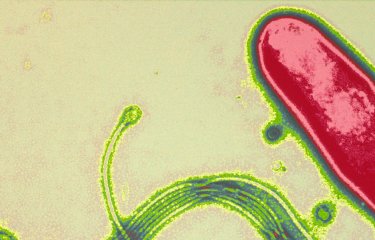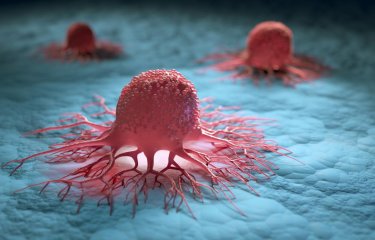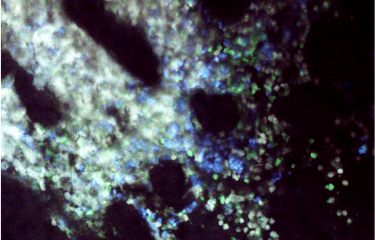Gastric cancer, the third most common cause of cancer-related deaths, is often associated with a poor prognosis because it tends to be diagnosed at an advanced stage and is therefore difficult to treat. To reduce the death rate, it is essential to identify a biomarker enabling early diagnosis of this cancer. In pursuit of this goal, scientists from the Institut Pasteur, CNRS, and University of Rennes 1 working in partnership with the IMSS in Mexico and the University of Florence in Italy, analyzed the mechanisms involved in the development of gastric cancer during infection by the bacterial pathogen Helicobacter pylori. As a result, they were able to identify a potential susceptibility marker. Their findings were published in the journal Gut on December 10, 2019.
Helicobacter pylori is a bacterial pathogen that colonizes the stomachs of almost half the world's population. H. pylori infection is acquired in childhood and lasts for decades. While remaining asymptomatic in most individuals, in some cases the infection develops into gastric cancer. H. pylori is currently thought to be responsible for approximately 90% of gastric cancer cases throughout the world, with an estimated death rate of approximately 800,000 per year.
The first steps have been taken toward deciphering the sequence of events triggered by bacterial infection ultimately leading to gastric cancer, a mechanism in which infected cell DNA instability plays a key role. Previous studies have demonstrated that H. pylori causes DNA breaks and impairs the DNA repair systems by stimulating the accumulation of mutations potentially targeting p53, a protein known as the "guardian of the genome".
Protein p53 is essential for proper cell function since, if significant damage occurs within the genome, it temporarily stops the cell cycle for a sufficient period of time to repair DNA. If p53 is inactivated, the genome is therefore more likely to accumulate instabilities, and normal cells have a greater chance of transforming into cancer cells. It is important to understand cellular transformation caused by H. pylori, which stimulates cancer development, in order to identify a susceptibility marker. This would enable early treatment of patients, thus preventing the development of gastric cancer.
In vitro, in vivo, and clinical testing
The group led by Marie-Dominique Galibert, a scientist at the Rennes Institute of Genetics and Development (University of Rennes 1/CNRS) previously conducted studies revealing that, in response to DNA damage, p53 is stabilized by its interaction with the transcription factor USF1, thus enabling p53 to play its role in DNA repair. However, in vitro results from this publication relating to cell lines demonstrate that H. pylori not only reduces nuclear levels of factor USF1, but also relocates it, leading to its accumulation at the periphery of cells, thus preventing the formation of USF1/p53 complexes in the cell nucleus. If destabilized, protein p53 loses its function, resulting in accumulated oncogenic changes in infected cells, promoting their transformation into cancer cells. Therefore, the loss of USF1 from the nucleus is a key factor in inhibiting p53 activity, which stimulates the development of gastric cancer.
These findings have been confirmed by in vivo studies. Scientists demonstrated that gastric inflammatory lesions caused by H. pylori infection were more severe in a mouse model deficient in factor USF1. These results are also supported by clinical findings, since the prognosis is worse for gastric cancer patients with low levels of USF1 combined with low levels of p53.
These data provide a new conceptual basis for improving patient management. Indeed, variations in USF1 levels in gastric tumor tissue could be an indicator of poor prognosis in cases of gastric cancer, thus enabling subsets of patients at higher risk or with more severe forms of cancer to be identified.
Eliette Touati, joint last author of the article and scientist within the Helicobacter Pathogenesis Unit (Institut Pasteur/CNRS), concludes: "For the first time, we have demonstrated that the loss of transcription factor USF1 accelerates carcinogenesis caused by Helicobacter pylori. This makes USF1 a potential biomarker for gastric cancer susceptibility and a new therapeutic target in the treatment of this cancer."
This work was funded by the research organizations mentioned above and also by Odyssey Reinsurance Company, the French Cancer League (LNCC), the Biosit joint service unit (UMS), and the Fondo de Investigacion en Salud (IMSS).
Source
USF1 defect drives p53 degradation during Helicobacter pylori infection and accelerates gastric carcinogenesis, Gut, December 10, 2019
Lionel Costa (a,b,c), Sébastien Corre (d), Valérie Michel (a), Krysten Le Luel (a,c), Julien Fernandes (a,e), Jason Ziveri (a,f), Gregory Jouvion (g), Anne Danckaert (e), Nicolas Mouchet (h), David Da Silva Barreira (a,i), Javier Torres (j), Margarita Camorlinga (j), Mario Milco D’Elios (k), Laurence Fiette (l), Hilde De Reuse (a), Marie-Dominique Galibert (d, m,*), Eliette Touati (a,*)
(a) Institut Pasteur, Department of Microbiology, Unit of Helicobacter Pathogenesis, CNRS ERL6002
(b) Institut Cochin, INSERM U1016, CNRS UMR 8104
(c) Université Paris Diderot, Sorbonne Paris Cité
(d) Université de Rennes 1, CNRS, (IGDR) Institut de Génétique et Développement Rennes-UMR6290
(e) Institut Pasteur, UtechS PBI-C2RT
(f) Institut fédératif de Recherche Necker-Enfants Malades, Pathogenesis of Systemic Infection
(g) Institut Pasteur, Unit of Experimental Neuropathology
(h) Université de Rennes 1, Institut de Génétique et Développement de Rennes
(i) Université de Bourgogne, AgroSup, Laboratoire PAM UMR A 02.102
(j) Instituto Mexicano del Seguro Social (IMSS), Unidad de Investigación Médica en Enfermedades Infecciosas y Parasitarias
(k) University of Florence, Experimental and Clinical l Medicine
(l) Institut Mutualiste Montsouris
(m) Université de Rennes 1, CHU, Department of Molecular Genetics and Genomics
* Joint senior authors





